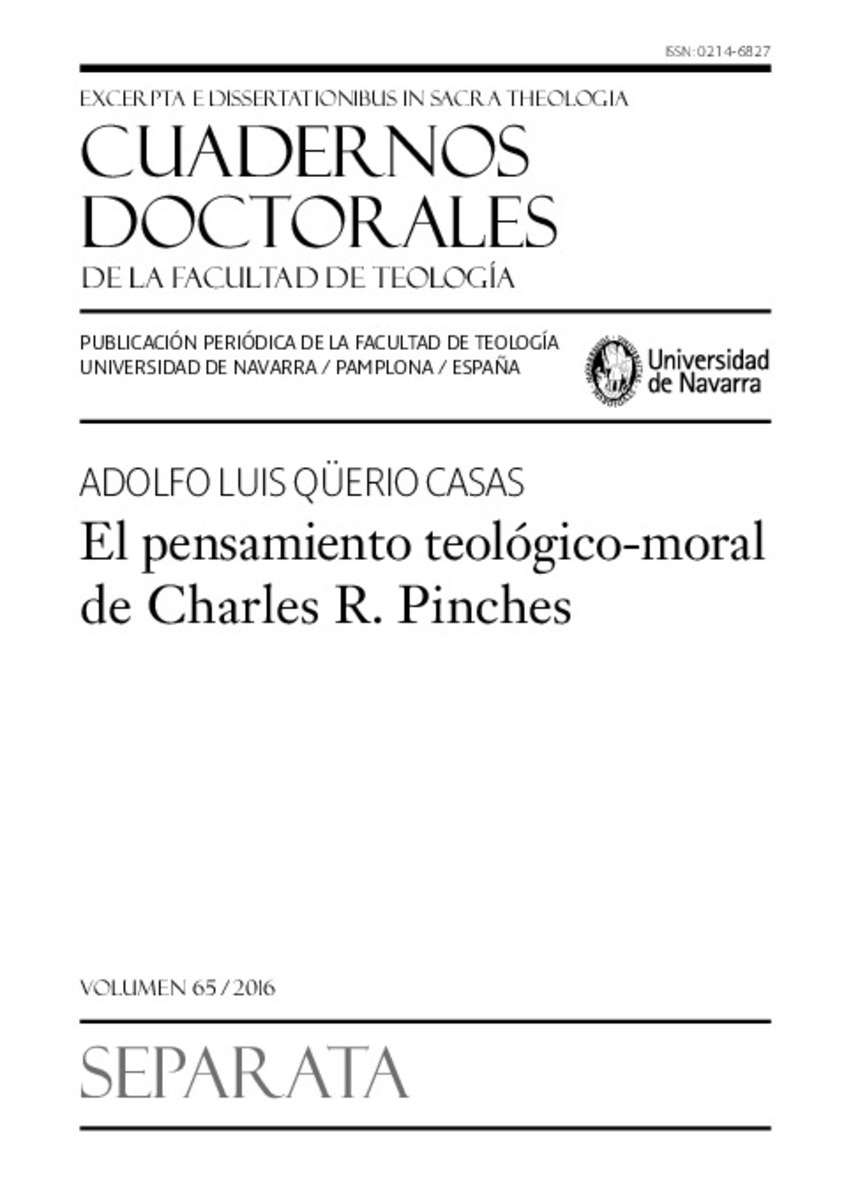Full metadata record
| DC Field | Value | Language |
|---|---|---|
| dc.creator | Qüerio Casas, L (Luis) | - |
| dc.date.accessioned | 2016-11-15T11:31:51Z | - |
| dc.date.available | 2016-11-15T11:31:51Z | - |
| dc.date.issued | 2016 | - |
| dc.identifier.citation | Qüerio Casas, L. (2016). El pensamiento teológico-moral de Charles R. Pinches. Cuaderno de docotrados de Teología 65 | es_ES |
| dc.identifier.issn | 0214-6827 | - |
| dc.identifier.uri | https://hdl.handle.net/10171/42231 | - |
| dc.description.abstract | A mitad del siglo pasado han surgido autores en el ámbito de la filosofía moral que se propusieron revitalizar el estudio de la ética de las virtudes. Buscaron dos objetivos principales: desarrollar una mejor comprensión de la dinámica del perfeccionamiento moral del hombre moderno y denunciar el fracaso de los planteamientos éticos basados en una moral del deber, de la utilidad, de la obligación o la norma. Uno de los autores que en la actualidad trabaja en esta línea de renovación de la moral es el Profesor Charles R. Pinches, Director del Departamento de Teología y Religión de la Universidad de Scranton, en Pennsylvania, Estados Unidos. Realizó su tesis doctoral en 1984 en la Universidad de Notre Dame bajo la guía de Stanley Hauerwas. Su propuesta se apoya de una manera significativa en las obras de santo Tomás de Aquino. Así también en la visión aristotélica de las virtudes siguiendo sobre todo el enfoque de autores como G. E. M. Anscombe, A. MacIntyre y S. Hauerwas los cuales promovieron una relectura de las obras del Estagirita con el fin retomar la fundamentación de la perfección moral y la búsqueda de felicidad desde la práctica de la virtud. Es de suma importancia en su planteamiento entender al hombre como un ser dependiente de una historia, de una comunidad y una narrativa determinada. El actuar humano y su descripción moral no debe ni puede concebirse como una realidad irreductible, como si las acciones particulares fueran entidades individuales discretas, que puedan ser analizadas de manera aislada de las peculiaridades del sujeto. | es_ES |
| dc.description.abstract | In the middle of the last century there have been authors in the field of moral philosophy proposed to revitalize the study of virtue ethics. They searched for two main objectives: to develop a better understanding of the dynamics of moral development of modern man and denounce the failure of ethical approaches based on a moral duty, moral utility, or moral obligation. One of the authors currently working on this area of moral renewal is Professor Charles R. Pinches, Head of the Department of Theology and Religion at the University of Scranton in Pennsylvania, United States. He completed his Ph. D. in 1984 from the University of Notre Dame under the guidance of Stanley Hauerwas. His proposal is based on a meaningful way in the works of Thomas Aquinas. It also rests in the Aristotelian view of virtue, especially following the approach of authors such as G. E. M. Anscombe, A. MacIntyre, and S. Hauerwas. The three of them have promoted the reading of Aristotle¿s works to reestablish the foundation of moral perfection and the pursuit of happiness from the practice of virtue. It is imperative in its approach the understanding of the human being as dependent from its history, community and, a particular narrative. The human action and moral description should not be conceived as an irreducible reality, as if the individual actions were discrete individual entities, which can be analyzed in isolation of the peculiarities of the subject. | es_ES |
| dc.language.iso | spa | es_ES |
| dc.publisher | Servicio de Publicaciones de la Universidad de Navarra | es_ES |
| dc.rights | info:eu-repo/semantics/openAccess | es_ES |
| dc.subject | Descripción moral | es_ES |
| dc.subject | Narrativa | es_ES |
| dc.subject | Virtudes | es_ES |
| dc.title | El pensamiento teológico-moral de Charles R. Pinches. | es_ES |
| dc.type | info:eu-repo/semantics/article | es_ES |
Files in This Item:
Statistics and impact
Items in Dadun are protected by copyright, with all rights reserved, unless otherwise indicated.






